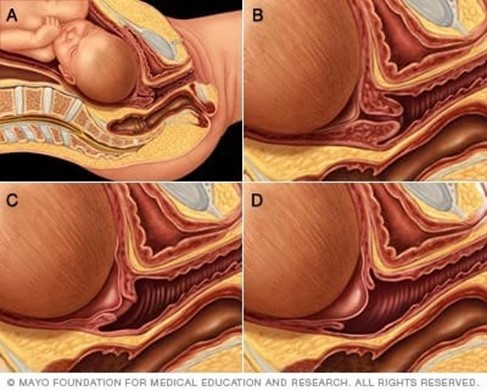A nurse is reinforcing teaching with the mother of a newborn who is small for gestational age. Which of the following should the nurse include as a cause of this condition?
Placental insufficiency
Primipara
Maternal obesity
Perinatal asphyxia
The Correct Answer is A
Choice A reason:
Placental insufficiency is a condition in which the placenta does not deliver enough oxygen and nutrients to the developing baby, resulting in restricted growth and development. This is one of the most common causes of SGA babies.
Choice B reason:
Primipara means a woman who is pregnant for the first time or who has given birth to one child. Primipara is not a cause of SGA, although some studies have suggested that first-time mothers may have a slightly higher risk of having a low-birth-weight baby than multiparous women.
Choice C reason:
Maternal obesity is a condition in which the mother has a body mass index (BMI) of 30 or higher before or during pregnancy. Maternal obesity is not a cause of SGA, but rather a risk factor for having a large-for-gestational-age (LGA) baby, which can lead to complications such as macrosomia, shoulder dystocia, and birth trauma.
Choice D reason:
Perinatal asphyxia is a condition in which the baby does not receive enough oxygen before, during, or after birth, causing hypoxia and acidosis. Perinatal asphyxia is not a cause of SGA, but rather a possible complication of SGA, especially if the placental insufficiency is severe or prolonged. Perinatal asphyxia can damage the brain and other organs of the baby and lead to long-term neurological impairments.
Nursing Test Bank
Naxlex Comprehensive Predictor Exams
Related Questions
Correct Answer is A
Explanation
Choice A reason:
Expressions of excitement are an expected finding during the taking-in phase of maternal postpartum adjustment. This is the time of reflection for the woman because, within the 2 to 3-day period, the woman is passive and dependent on her healthcare provider or support person with some of the daily tasks and decision-making. The woman prefers to talk about her experiences during labor and birth and also her pregnancy. The taking-in phase provides time for the woman to regain her physical strength and organize her rambling thoughts about her new role.
Choice B reason:
Lack of appetite is not an expected finding during the taking-in phase of maternal postpartum adjustment. The woman is oriented primarily to her own needs and she primarily focuses on sleeping and eating. She may have increased appetite due to the energy expenditure during labor and delivery. Lack of appetite may indicate postpartum depression or other complications.
Choice C reason:
Eagerness to learn newborn care skills is not an expected finding during the taking-in phase of maternal postpartum adjustment. This is more characteristic of the taking-hold phase, which starts 2 to 4 days after delivery. The woman starts to initiate actions on her own and make decisions without relying on others. She starts to focus on the newborn instead of herself and begins to actively participate in newborn care.
Choice D reason:
Focus on the family unit and its members is not an expected finding during the taking-in phase of maternal postpartum adjustment. This is more indicative of the letting-go phase, which occurs when the woman finally accepts her new role and gives up her old role. This is the phase where postpartum depression may set in. Readjustment of the relationship is needed for an easy transition to this phase.
Correct Answer is B
Explanation
Choice A reason:
Contractions every 3 to 4 min are not a definitive sign of labor, as they can also occur in false labor or Braxton Hicks contractions. These are irregular and do not cause cervical changes.

Choice B reason:
Cervical dilation is the most reliable indicator of true labor, as it shows that the uterus is contracting effectively and preparing for delivery. Cervical dilation is measured in centimeters from 0 to 10, with 10 being fully dilated.
Choice C reason:
Pain just above the navel is not a sign of labor, but rather a possible sign of an abdominal problem such as appendicitis or gallbladder disease. Labor pain usually starts in the lower back and radiates to the abdomen and thighs.
Choice D reason:
Amniotic fluid in the vaginal vault is not a conclusive sign of labor, as it can also result from a premature rupture of membranes (PROM) or a high leak of amniotic fluid. PROM occurs when the amniotic sac breaks before the onset of labor, which can increase the risk of infection and complications for the mother and the baby.
Whether you are a student looking to ace your exams or a practicing nurse seeking to enhance your expertise , our nursing education contents will empower you with the confidence and competence to make a difference in the lives of patients and become a respected leader in the healthcare field.
Visit Naxlex, invest in your future and unlock endless possibilities with our unparalleled nursing education contents today
Report Wrong Answer on the Current Question
Do you disagree with the answer? If yes, what is your expected answer? Explain.
Kindly be descriptive with the issue you are facing.
